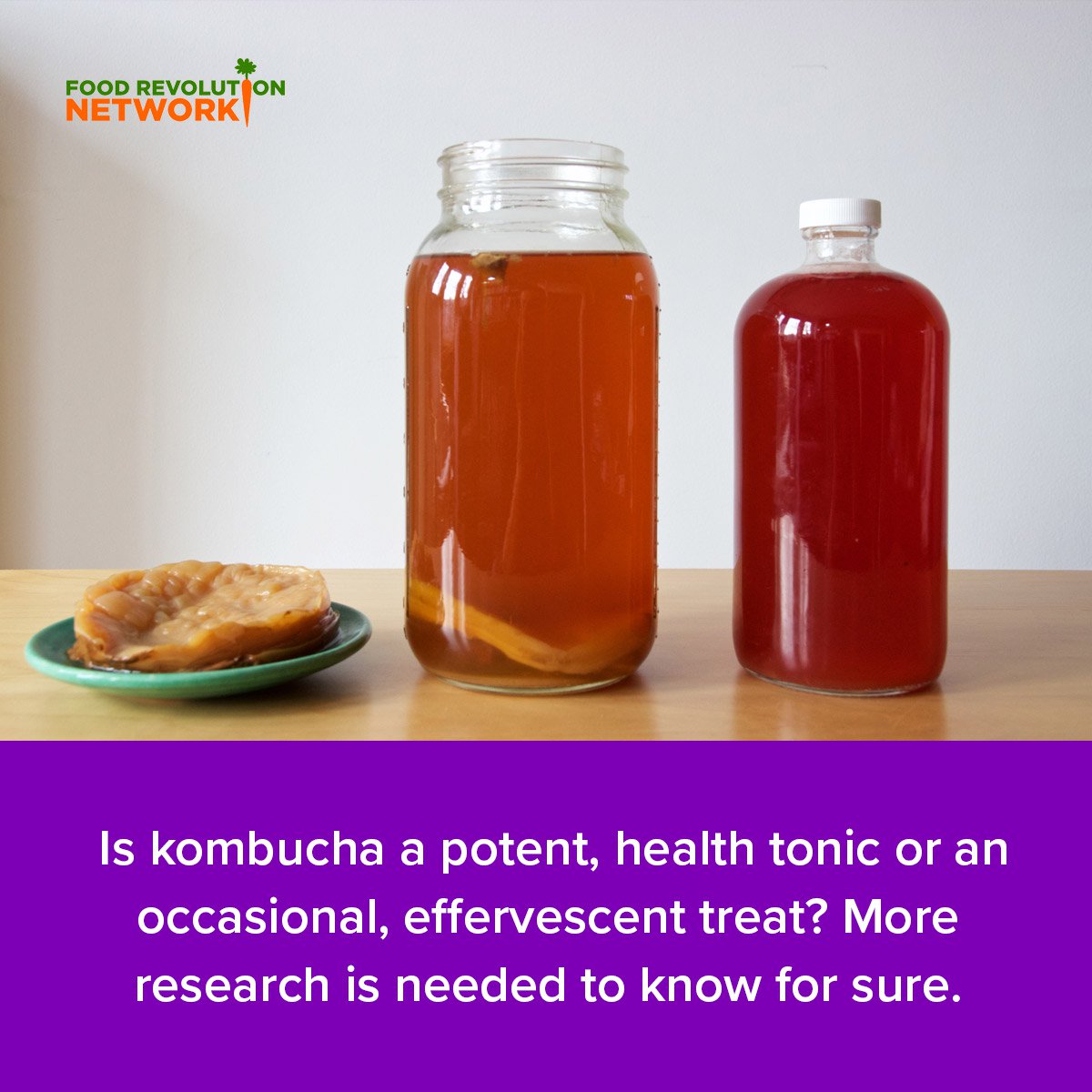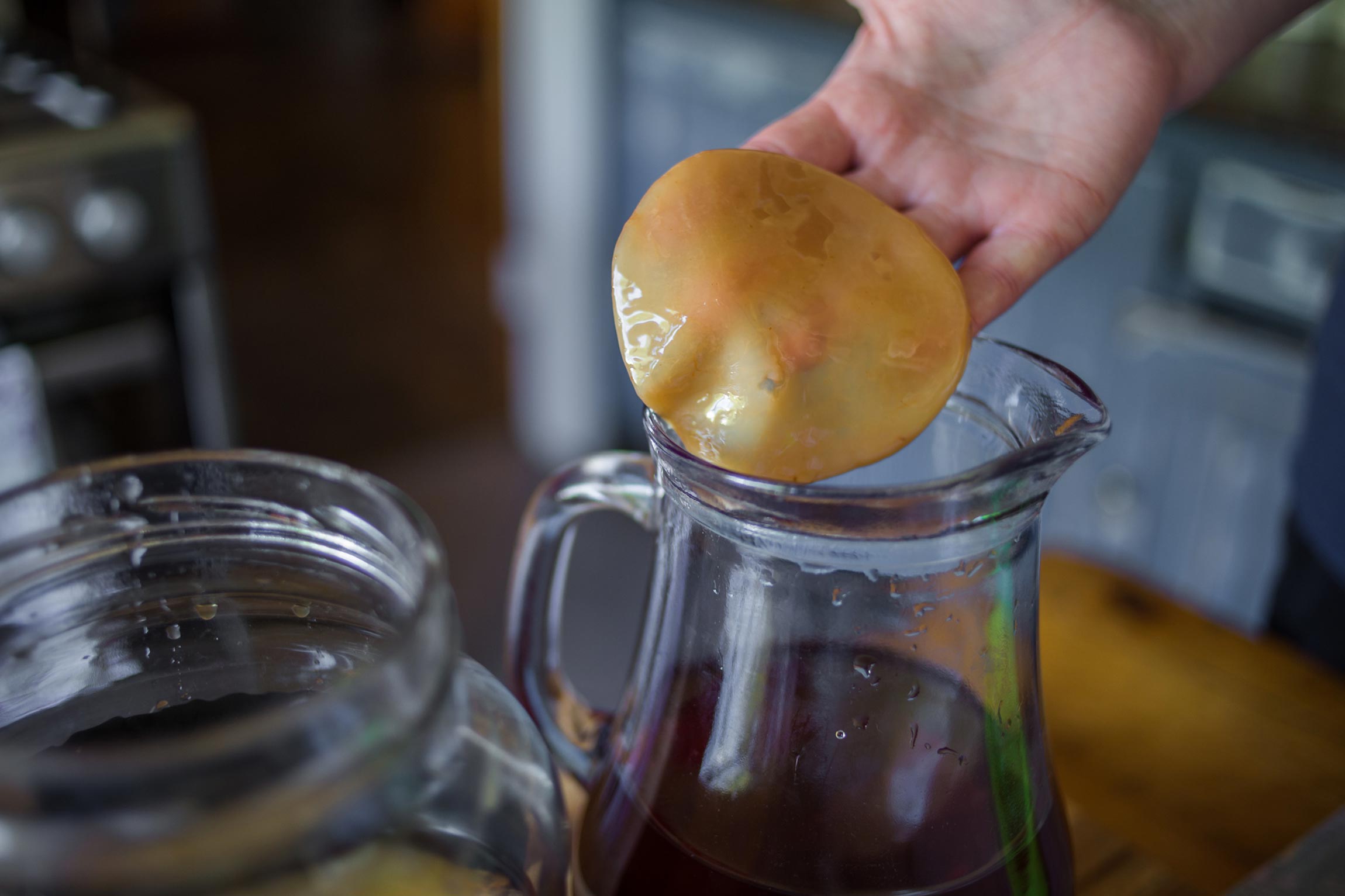
Kombucha is a sweetened, fermented tea.
The fermentation process creates, among other things, carbon dioxide (which gives the tea its fizz), alcohol. It also creates a variety of acids including acetic acid, lactic acid, propionic acid, glucuronic acid, and gluconic acid.
The taste of kombucha varies. But it typically has a slightly sweet, slightly sour, vinegary flavor and a light, effervescent feel. Some people say it resembles the taste of sparkling cider.
Flavored kombuchas are made by adding fruit purees or fruit juice concentrates, herbs, spices, and other ingredients.
How Is Kombucha Made?

Traditionally green, black, or white tea (which all come from the Camellia sinensisplant) is used to make kombucha. Most herbal teas don’t have the nutrients needed to make the process work.
A sweetener is then added — usually white sugar. Other sweeteners have been used, as well, such as honey, maple syrup, and Jerusalem artichoke tuber extract.
Then, the mixture of tea and sweetener ferments with the help of a symbiotic culture of bacteria and yeast (also known as a SCOBY, or a “mother”).
A SCOBY is a thick, round, floating microbial colony that resembles a mushroom. Even though kombucha is sometimes called “mushroom tea,” it doesn’t contain any mushrooms.
The SCOBY is a self-perpetuating culture. This means it multiplies itself through the process of creating kombucha tea. (New starter colonies are sometimes called “daughters” or “babies.”)
After a period of time — anywhere between three and 30 days — the kombucha is ready to drink.
What About the Alcohol Content of Kombucha?
During the fermentation process, the culture turns sugar into ethanol, which is a type of alcohol. So the resulting beverage contains alcohol.
But how much alcohol is actually in kombucha?
Compared to a standard alcoholic beverage like a 12-oz beer (5% alcohol) or a 5-oz glass of wine (12% alcohol), not much. Kombucha typically contains about 0.5 to (rarely) as much as 2% alcohol.
The bottled kombuchas you see in stores have to follow the U.S. government requirements for non-alcoholic beverages. This means unless their labels say, “21 and over,” they must contain less than 0.5% alcohol.
While the alcohol content is low, it can cause problems for some people, particularly recovering alcoholics. But for most people, it’s not much of an issue because it’s less than 1/10 the amount typically found in beer.
Are There Benefits to Drinking Kombucha?

Tea is a remarkably healthy beverage. Its proven benefits range from helping fight cancer and improving bone strength to burning fat and protecting against cardiovascular disease.
Kombucha comes from tea. So how does it stack up?
Studies on kombucha have found polyphenols, acids, and vitamins, which are in regular green and black tea. In fact, in one study, kombucha tea had more antioxidants than unfermented tea.
Polyphenols in tea have shown great potential in protecting against some types of cancer. The most potent benefit of tea — both fermented and unfermented — may be its catechin content. Catechins act as potent antioxidants and protect against the development of disease. And many of them are abundant in kombucha.
In addition to the beneficial components found in tea, new compounds form when you make kombucha, which may also have favorable effects. One compound is DSL (D-Saccharic acid-1,4-lactone). DSL has the potential to inhibit an important enzyme that may be linked to cancer growth. More study is needed to determine if this will also provide benefits to humans.
According to a 2008 study published in Food Chemistry, DSL is one of many new compounds created during the fermentation process.
So kombucha likely has many of the same stunning health benefits of drinking tea. And it may also have some additional benefits stemming from the DSL and other new compounds in kombucha that aren’t in unfermented tea.
What Does Science Say About the Health Claims of Kombucha, In Particular?
If you look at the research around kombucha and its benefits, one thing is clear: We need more research.
There are a lot of health claims made about kombucha, but there aren’t enough studies for us to know if they are true or not.
But so far, no studies have been published on the biological effects of kombucha on humans.
We have animal studies and some decently valid sounding theories. (I’m not a fan of animal studies because they are often cruel, but I think they can sometimes be useful.) But we lack scientific evidence to back up many of the health claims about kombucha. It seems plausible that it brings some positive health benefits. But so far, there are no published studies on the biological effects of kombucha on humans.
While we lack certainty, an impressive body of studies do suggest that kombucha tea could have antimicrobial, energizing, and detoxification effects. And it may even help prevent disease, including cancer, heart disease, and type 2 diabetes.
For example:
- Kombucha could potentially help prevent a broad range of diseases. A 2014 review of animal studies published in the Journal of Medicinal Food found that kombucha tea contains properties that could help prevent many diseases, particularly “broad-spectrum metabolic and infective disorders.” They concluded that it may be able to help with detoxification, antioxidation, and healthy immune function.
- Kombucha could slow or kill harmful microorganisms. A 2012 study publishedin the Journal of Food Chemistry reported that kombucha made from both black and green tea had antimicrobial potential. Researchers also found that the green fermented tea had the most antimicrobial potential. Other studies have shownthat kombucha could kill bacteria that commonly cause food poisoning.
- Kombucha may have cancer-fighting power. A 2013 study published in Biomedicine & Preventive Nutrition showed that kombucha had remarkable potential to inhibit angiogenesis. (Angiogenesis is the process by which cancers lock in a steady supply of blood and become dangerous.)
- Kombucha may help protect the liver. A 2009 study on some very unfortunate rats published in the Journal of Microbiology and Biotechnology revealed that kombucha tea was effective in improving liver function and lowering the side effects of toxins.
- Kombucha may reduce heart disease risk. In other studies also done on rats, kombucha improved two markers of heart disease in as few as 30 days. A 2015 study published in Pharmaceutical Biology found that kombucha lowered “bad” LDL. It also led to higher levels of “good” HDL cholesterol.
- Kombucha may help manage diabetes. A 2012 study published in BMCComplementary and Alternative Medicine on diabetic rats found that kombucha slowed down the digestion of carbohydrates, reducing blood sugar levels. Kombucha also improved liver and kidney function.
- Kombucha is a rich source of probiotics. Kombucha is a fermented food and carries a large number of probiotic bacteria that may be beneficial to your digestive health. A 2014 study published in Food Microbiology identified a prominent Lactobacillus population and numerous beneficial yeast species that were abundant in kombucha.

Комментариев нет:
Отправить комментарий